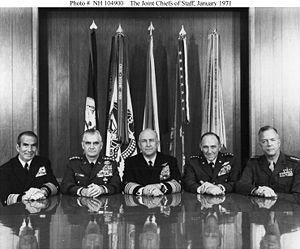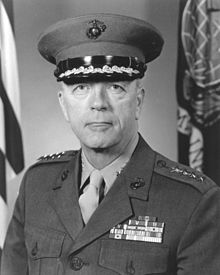Leonard F. Chapman Jr.
Leonard Fielding Chapman Junior (born November 3, 1913 in Key West , Florida - † January 6, 2000 in Falls Church , Virginia ) was a general in the United States Marine Corps and served in the Pacific theater during World War II . Chapman took part in the naval battles in the Coral Sea and around the Midway Islands as commandant of the Marine Corps detachment on the cruiser USS Astoria (CA-34) , and commanded a battalion on Peleliu and Okinawa . From 1968 to 1971 he was the 24th Commandant of the Marine Corps and led it through the hot phase of the Vietnam War and a time marked by social unrest. He then was a commissioner in the US Immigration and Naturalization Service .
Life
Early years
Leonard Fielding Chapman was born in Key West to a Methodist minister and grew up in DeLand , Florida, where he graduated from high school. In 1931 he began his studies at the University of Florida and became a member of the fraternity Phi Kappa Tau . He also joined the Reserve Officer Training Corps . After completing his studies in June 1935, Chapman was placed on the following July 8th with the rank of Second Lieutenant in the service of the US Marine Corps .
After graduating from Basic School at the Philadelphia Navy Yard , Chapman served in the 1st Battalion of the 10th Marine Regiment , based at Marine Corps Base Quantico , Virginia . He then graduated from the US Army Field Artillery School in Fort Sill , Oklahoma , and was transferred to San Diego , California in June 1938 . In the same year he was promoted to First Lieutenant . In June 1940, Chapman left the west coast for Honolulu , where he attended a gunnery course aboard the cruiser USS New Orleans (CA-32). For the next two years he was the commanding officer of the Marines ' detachment aboard the USS Astoria (CA-34).
Second World War
During the Japanese attack on Pearl Harbor on December 7, 1941 , which caused the United States to enter the war at the side of the Allies, the Astoria was at sea with Chapman, who had meanwhile been promoted to captain . Two days earlier she had sailed with the aircraft carrier USS Lexington (CV-2) and other escort ships from Pearl Harbor to transport fighter planes to Midway . After the failed attempt to horrify the hard-fought island of Wake , the cruiser remained with patrol and escort duties. In early May 1942 , Chapman , who was promoted to major , took part with the Astoria in the first naval battle between aircraft carriers in the Coral Sea and a month later in the Battle of Midway. Chapman left the ship in late June and was appointed an instructor in the artillery teaching department of the Quantico-based Marine Corps Schools in early August. During this time the USS Astoria was sunk in the naval battle off Savo Island . In May 1943, Chapman was promoted to lieutenant colonel and the following October, he was appointed assistant commandant of the teaching department.
A year later he was transferred to the 1st US Marine Division, where he took command of the IV Battalion of the 11th US Marine Regiment . In addition to this activity, he was also an operations officer in the regimental staff during the Battle of Peleliu in autumn 1944 . Because of extraordinary services as a staff officer, he was awarded the Legion of Merit and the Bronze Star as battalion commander in the fighting on Okinawa between April and July 1945 .
post war period
After the fighting ended, Chapman returned to the United States and worked until July 1946 as Secretary to the General Staff of the Fleet Marine Force Pacific. He was then appointed to the headquarters of the Marine Corps in Washington, DC, where he was entrusted with the post of deputy head of the planning and tactics department. In May 1949 he went to the Marine Corps Schools, where he coordinated the training intervals of the artillery units in reserve before he was appointed to the Amphibious Warfare School, which he was able to complete in June 1950. Chapman found his next engagement as a group leader in the corps development center. In this capacity he was stationed in Quantico and received his promotion to colonel there . Two years later he became the commander of the 12th Marine Regiment of the 3rd Marine Division, stationed in Camp Pendleton , California , which was transferred to Japan in August 1953 . Between August 1954 and May 1956 he was the commanding officer of all marines stationed at the Yokosuka naval base .
Chapman returned to Washington, DC where he became Commanding Headquarters and Director of the Marine Corps Institute , located at the Washington Navy Yard . On July 1, 1958, he was promoted to Brigadier General and received a position with the Fleet Marine Force Atlantic at Camp Lejeune , North Carolina .
In September 1961 he took up the post of Deputy Chief of Staff of the Marine Corps, followed by promotion to Major General a few weeks later. In this capacity he was again awarded the Legion of Merit. At the beginning of 1964 he became chief of staff, at the same time with the necessary rank of lieutenant general , and in July 1967 deputy commandant of the Marine Corps.
Commandant of the US Marine Corps

On December 4, 1967, Chapman was nominated by then US President Lyndon B. Johnson for the office of 24th Commander of the Marine Corps and confirmed by the US Senate nine days later. On January 1, 1968, Chapman was promoted to four-star general ; he succeeded General Wallace Greene on the post.
Just a few weeks after taking up his duties, the Tet Offensive marked the turn of the Vietnam War to the detriment of the United States and South Vietnam. During this phase, the US Marines stationed in Khe Sanh and Huế faced heavy fighting. Furthermore, Chapman's first year of service was marked by numerous trips to visit marines stationed around the world. During these activities he covered approx. 161,000 km and came among other things. a. twice to Vietnam. Due to the looming defeat in the war, Chapman began to withdraw the majority of his soldiers ( III. Marine Amphibious Corps ) from the war zone, which could be ended in 1971.
"Don't leave anything behind worth more than five dollars."
"Don't leave anything that's worth more than five US dollars."
As a result of this measure and budgetary cuts, the strength of the Corps team was reduced from 289,000 to 198,000 men and prompted Chapman to focus on more professionalism instead of quantity in the future.
The United States in the late 1960s was shaped by civil rights movements protesting the repression of African Americans and black Africans and drug problems . These social changes did not stop at the US armed forces, so that there were clashes between white and colored soldiers in numerous barracks , as in the summer of 1969 at Camp Lejeune. In February 1970, one soldier was killed and another 62 injured after a group of enraged colored Marines threw a hand grenade into a Vietnamese nightclub. Chapman responded to this situation not only with disciplinary measures, but also with awareness-raising campaigns. One of the most significant reactions was the prohibition of any discrimination in training, assignment of posts and in the course of promotions. So he wrote in a 1000 word order to all troop commanders:
"Every marine must understand that the Marine Crops does guarantee equal rights, equal opportunity, and equal protections, without regard to race."
"Every Marine needs to understand that the Marine Corps guarantees equality, equality of opportunity, and preservation regardless of skin color."
A few days before his retirement, he received the Distinguished Service Medal from President Richard Nixon in recognition of his services.
retirement
Chapman was retired on January 1, 1972 after serving 37 years in the US Marine Corps. In 1973 the President entrusted him with the post of Commissioner of the Immigration and Naturalization Service , which he held for three years. He spent his old age in Alexandria .
Leonard Chapman died on January 6, 2000 of cancer at Inova Fairfax Hospital in Falls Church and was buried with military honors in Arlington National Cemetery. His grave speech was delivered by Carl Mundy , 30, commander of the Marine Corps and a good friend of the Chapman family.
Chapman was married to Emily Donelson Walton Ford Chapman (1916-1992) and had two sons, one of whom Leonard F. Chapman III, Major in the US Marine Corps, was killed in a diving accident in 1979. The bereaved include the eldest son Walton F. Chapman and his granddaughter Danielle Chapman.
Awards
Selection of decorations, sorted based on the Order of Precedence of the Military Awards:
-
 Navy Distinguished Service Medal (x3)
Navy Distinguished Service Medal (x3) -
 Legion of Merit (x2)
Legion of Merit (x2) -
 Bronze star
Bronze star
-
 Navy & Marine Corps Commendation Medal
Navy & Marine Corps Commendation Medal
-
 Korean Service Medal
Korean Service Medal
Additional information
Individual evidence
- ^ A b Leonard Fielding Chapman, Jr. - General, United States Marine Corps. In: Arlington National Cemeterey. Retrieved June 18, 2008 .
- ↑ Gen. LF Chapman, 86, Dies; Former Marine Commandant. In: New York Times. Retrieved June 19, 2008 .
Web links
- Official Biography of the US Marine Corps (English)
- Biography on arlingtoncemetery.net (English)
| personal data | |
|---|---|
| SURNAME | Chapman, Leonard F. Junior |
| ALTERNATIVE NAMES | Chapman, Leonard Fielding junior (full name) |
| BRIEF DESCRIPTION | American military, general and 24th Commandant of the United States Marine Corps |
| DATE OF BIRTH | November 3, 1913 |
| PLACE OF BIRTH | Key West , Florida |
| DATE OF DEATH | January 6, 2000 |
| Place of death | Falls Church , Virginia |

